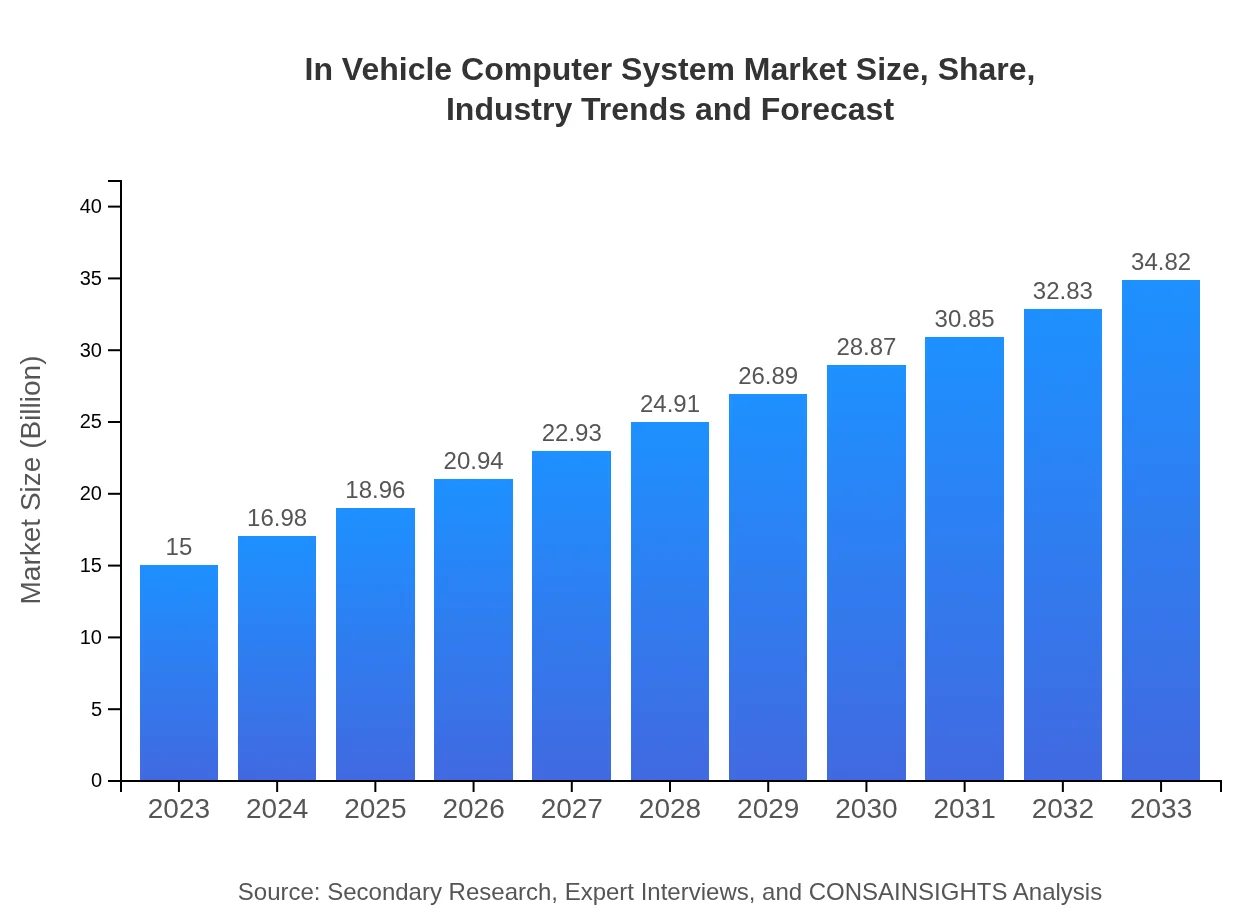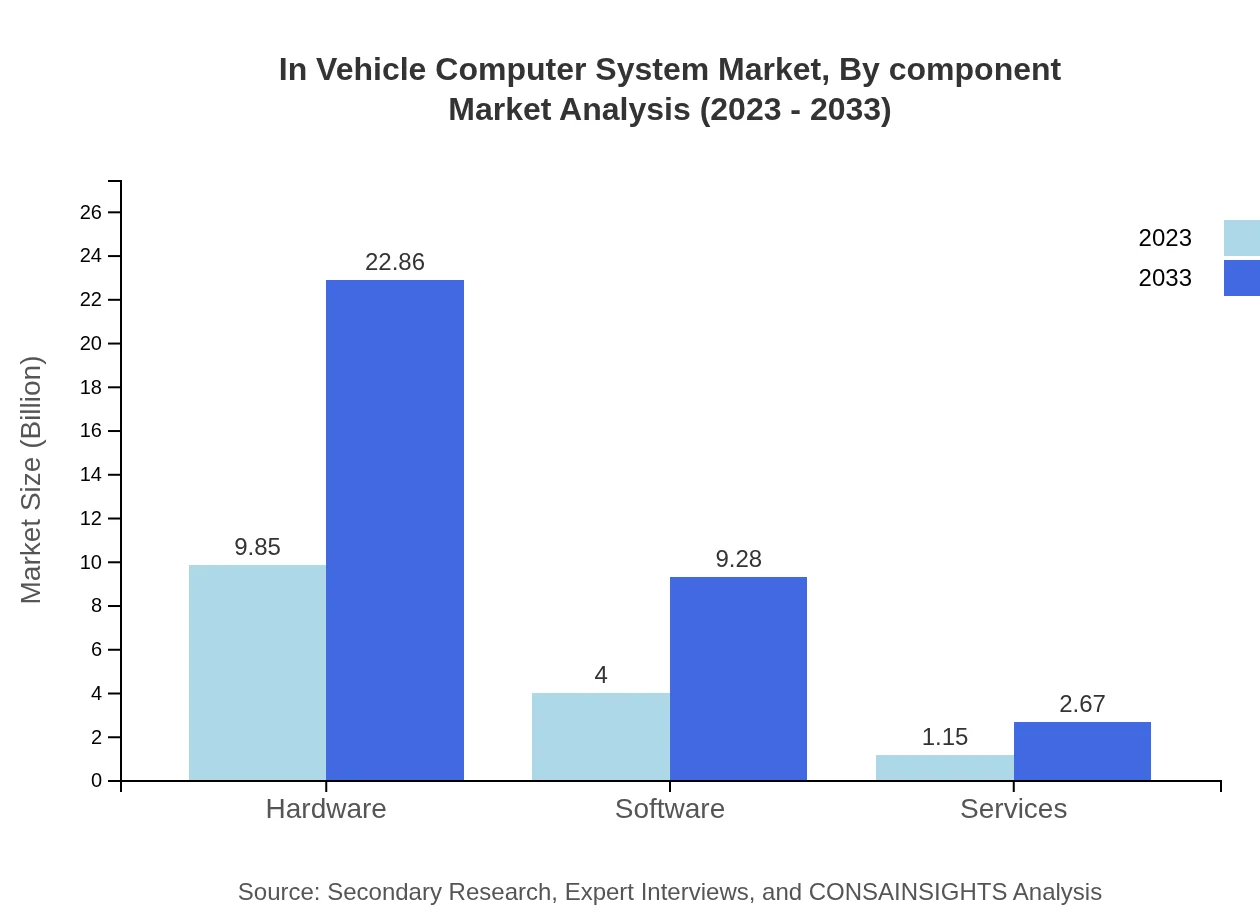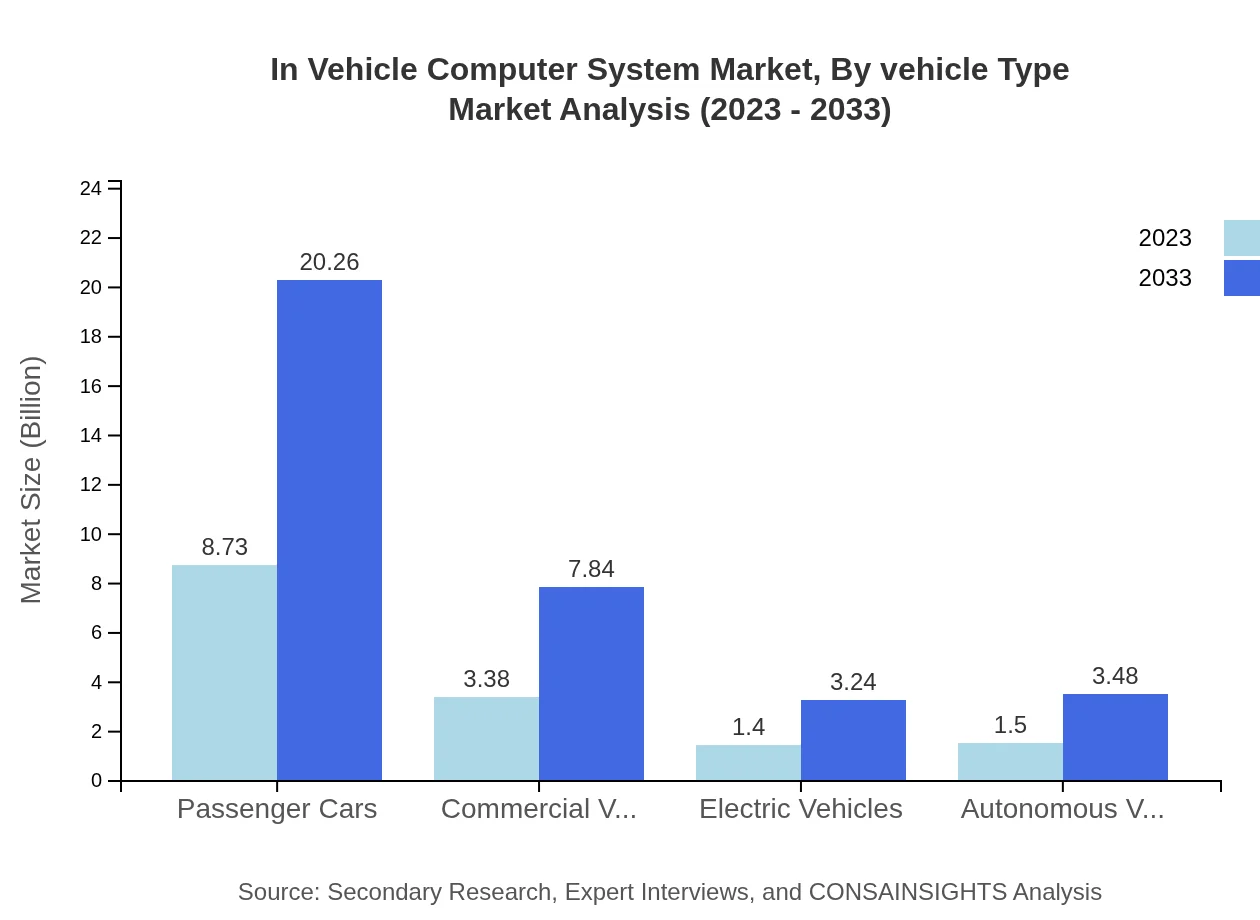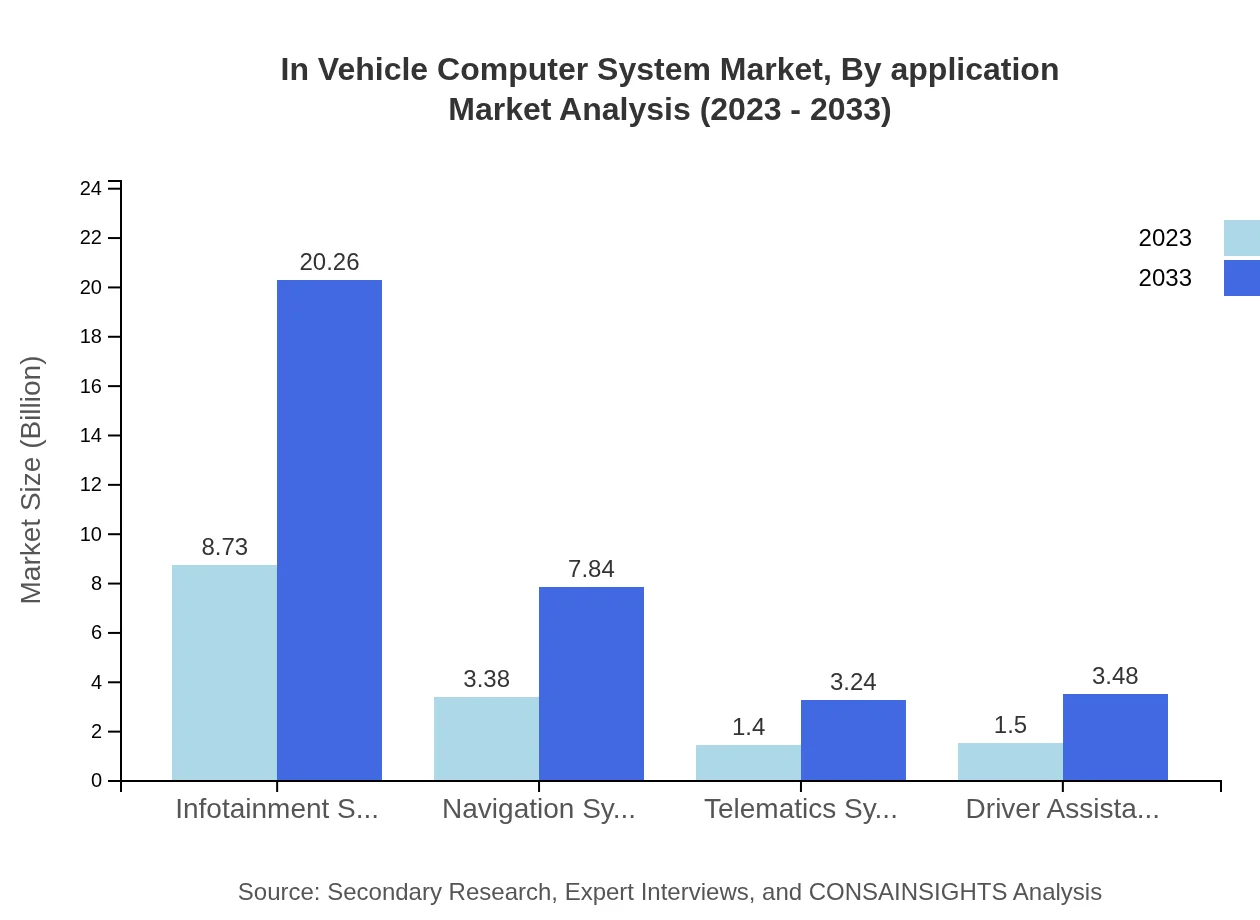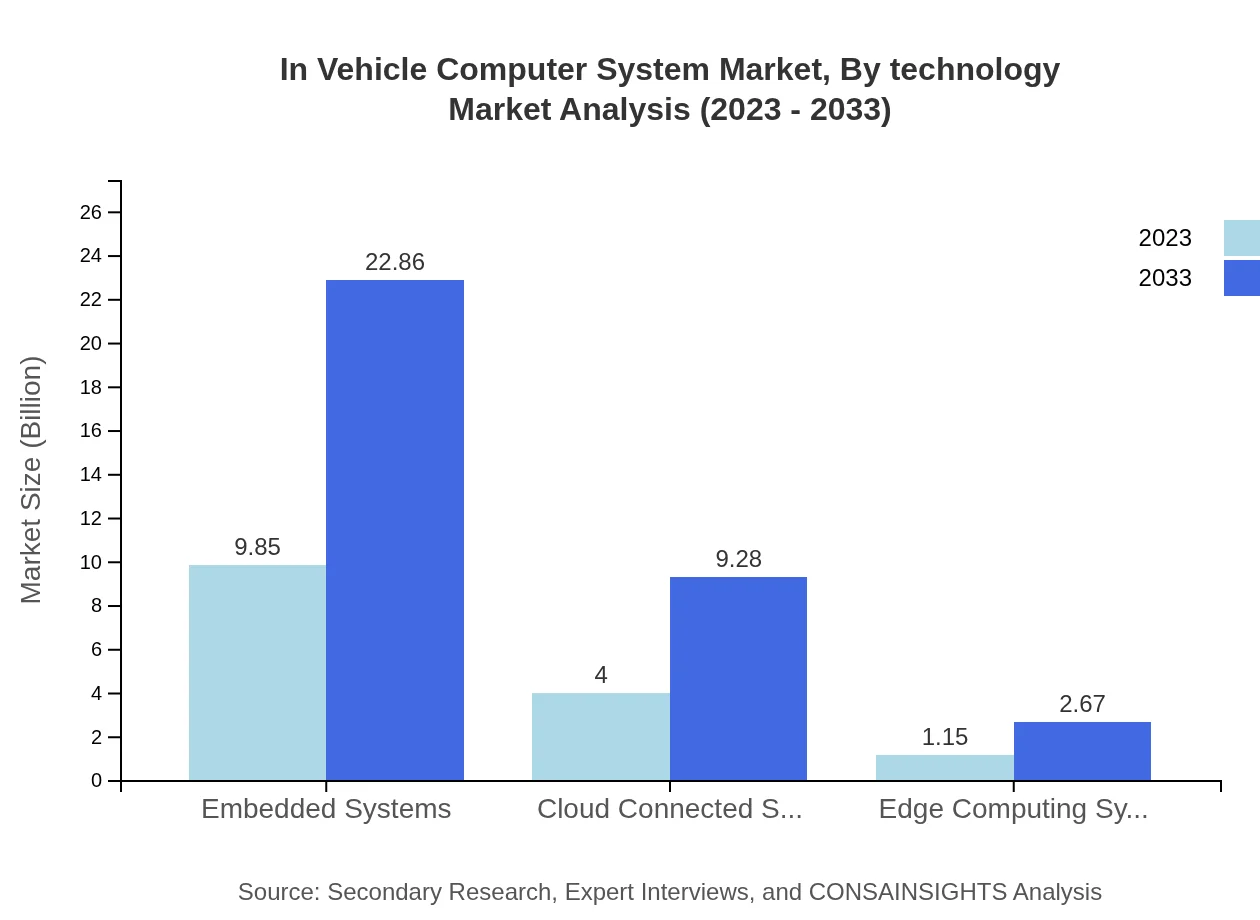In Vehicle Computer System Market Report
Published Date: 02 February 2026 | Report Code: in-vehicle-computer-system
In Vehicle Computer System Market Size, Share, Industry Trends and Forecast to 2033
This report provides an in-depth analysis of the In Vehicle Computer System market, encompassing market size, trends, and forecasts from 2023 to 2033, along with regional insights and key player profiles.
| Metric | Value |
|---|---|
| Study Period | 2023 - 2033 |
| 2023 Market Size | $15.00 Billion |
| CAGR (2023-2033) | 8.5% |
| 2033 Market Size | $34.82 Billion |
| Top Companies | Robert Bosch GmbH, Continental AG, DENSO Corporation, Samsung Electronics |
| Last Modified Date | 02 February 2026 |
In Vehicle Computer System Market Overview
Customize In Vehicle Computer System Market Report market research report
- ✔ Get in-depth analysis of In Vehicle Computer System market size, growth, and forecasts.
- ✔ Understand In Vehicle Computer System's regional dynamics and industry-specific trends.
- ✔ Identify potential applications, end-user demand, and growth segments in In Vehicle Computer System
What is the Market Size & CAGR of In Vehicle Computer System market in 2023?
In Vehicle Computer System Industry Analysis
In Vehicle Computer System Market Segmentation and Scope
Tell us your focus area and get a customized research report.
In Vehicle Computer System Market Analysis Report by Region
Europe In Vehicle Computer System Market Report:
Europe exhibits a strong growth trajectory in the In Vehicle Computer System market, projected to increase from $4.50 billion in 2023 to $10.45 billion by 2033. Stringent regulations on emissions and vehicle safety propel advancements in in-vehicle technology.Asia Pacific In Vehicle Computer System Market Report:
The Asia Pacific region is witnessing accelerated growth in the In Vehicle Computer System market, with a valuation of $2.81 billion in 2023, expected to reach $6.51 billion by 2033. Key drivers include a booming automotive industry, coupled with increasing consumer preferences for technology-enriched vehicles, particularly in countries like China and Japan.North America In Vehicle Computer System Market Report:
North America is a substantial player in the market, with a market size of $5.68 billion in 2023, forecasted to grow to $13.18 billion by 2033. The presence of major automotive manufacturers and a focus on innovation and technology integration are key drivers.South America In Vehicle Computer System Market Report:
In South America, the market is expected to grow from $0.28 billion in 2023 to $0.64 billion by 2033. Economic recovery and increasing vehicle ownership are contributing factors, though challenges remain regarding infrastructure and technological investments.Middle East & Africa In Vehicle Computer System Market Report:
In the Middle East and Africa, the market is estimated to grow from $1.74 billion in 2023 to $4.03 billion by 2033. Investments in smart city initiatives and rising demand for luxury vehicles contribute to market expansion in these regions.Tell us your focus area and get a customized research report.
In Vehicle Computer System Market Analysis By Component
In 2023, hardware dominates the segment with a market size of $9.85 billion, showcasing a 65.67% market share. By 2033, it's projected to reach $22.86 billion. Software revenue is also significant, growing from $4.00 billion (26.66% share) to $9.28 billion. Services, while smaller at $1.15 billion (7.67% share), are expected to grow to $2.67 billion.
In Vehicle Computer System Market Analysis By Vehicle Type
Passenger vehicles make up a considerable portion of the market, accounting for $8.73 billion in 2023 with a share of 58.18%, expected to grow to $20.26 billion by 2033. Commercial vehicles start at $3.38 billion (22.53% share) and are projected to reach $7.84 billion. Electric vehicles and autonomous vehicles currently constitute $1.40 billion and $1.50 billion, respectively, with both segments experiencing rapid growth due to increasing demand for electrification and self-driving technologies.
In Vehicle Computer System Market Analysis By Application
Key applications include infotainment systems, navigation systems, and telematics systems. Infotainment systems lead with a market size of $8.73 billion (58.18% share), growing to $20.26 billion. Navigation systems, valued at $3.38 billion (22.53% share), are expected to rise to $7.84 billion, while telematics systems grow from $1.40 billion (9.30% share) to $3.24 billion.
In Vehicle Computer System Market Analysis By Technology
Embedded systems account for a significant portion of the market, valued at $9.85 billion (65.67% share), projected to grow to $22.86 billion by 2033. Cloud-connected systems worth $4.00 billion will increase to $9.28 billion, and edge computing systems, starting at $1.15 billion, will see growth to $2.67 billion.
In Vehicle Computer System Market Trends and Future Forecast
Tell us your focus area and get a customized research report.
Global Market Leaders and Top Companies in In Vehicle Computer System Industry
Robert Bosch GmbH:
A global leader in automotive technology, Bosch provides a wide range of automotive components including advanced in-vehicle computer systems aimed at enhancing safety and efficiency.Continental AG:
Renowned for its innovations in tire technology and vehicle electronics, Continental develops sophisticated computer systems that contribute to vehicle connectivity and automated driving.DENSO Corporation:
A prominent player in the automotive market, DENSO focuses on developing advanced automotive technology including in-vehicle systems that support eco-friendly vehicle operation.Samsung Electronics:
Known for its consumer electronics, Samsung is also a significant contributor to the automotive in-vehicle computer system market through its leading-edge technology in infotainment and connectivity.We're grateful to work with incredible clients.









FAQs
What is the market size of in Vehicle Computer System?
The in-vehicle computer system market is projected to grow from $15 billion in 2023 to an estimated market size of approximately $34.5 billion by 2033, with a CAGR of 8.5%. This growth indicates robust demand across various vehicle types.
What are the key market players or companies in this in Vehicle Computer System industry?
Key players in the in-vehicle computer system industry include major automotive manufacturers, hardware suppliers, and software developers. Their innovations and partnerships are crucial in shaping market dynamics, enhancing system capabilities, and providing integrated solutions.
What are the primary factors driving the growth in the in Vehicle Computer System industry?
Growth in the in-vehicle computer system market is driven by increasing demand for advanced driver assistance systems, higher vehicle connectivity, and enhanced infotainment experiences. Furthermore, the surge in electric and autonomous vehicles also significantly impacts the market.
Which region is the fastest Growing in the in Vehicle Computer System?
Asia Pacific is currently the fastest-growing region in the in-vehicle computer system market, increasing from $2.81 billion in 2023 to $6.51 billion by 2033. Europe and North America also show substantial growth, driven by technology advancements and consumer demand.
Does ConsaInsights provide customized market report data for the in Vehicle Computer System industry?
Yes, ConsaInsights offers customized market report data tailored to client needs in the in-vehicle computer system industry. This includes insights on market trends, regional analysis, and specific segment performance for informed decision-making.
What deliverables can I expect from this in Vehicle Computer System market research project?
Deliverables from the in-vehicle computer system market research project will include comprehensive reports, data sets on market size and segments, competitive analysis, regional insights, and strategic recommendations to guide business planning and investment.
What are the market trends of in Vehicle Computer System?
Market trends in the in-vehicle computer system sector showcase a shift towards integrated hardware and software solutions, increasing adoption of cloud-connected systems, and a focus on enhanced customer experiences through infotainment and navigation systems.

